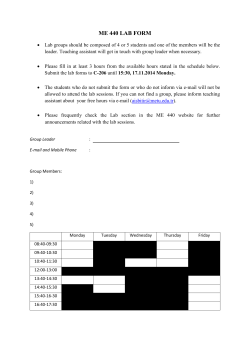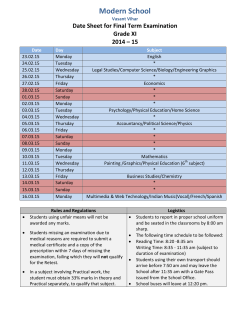
Spring - Carleton College
POSC 283: Separatist Movements Carleton College, Spring 2015 Professor Devashree Gupta Office: Willis 404 Phone: x4681 Email: dgupta@carleton.edu Skype: devashree.gupta1 Spring Term Office Hours Tuesday: 1:00-‐3:30pm Thursday: 1:00-‐3:30pm Skype by appointment COURSE INTRODUCTION This course explores the emergence and resolution of separatist movements around the world—those groups of individuals who reject their continued membership in an existing sovereign state and instead claim the right to govern themselves. We will investigate the conditions under which separatist pressures are most likely to develop and when such pressures result in actual separation. We will contrast the tactics of movements, from peaceful approaches in places like contemporary Quebec or Scotland, to peaceful outcomes like the "velvet divorce" of Czechoslovakia, to violent insurrections in places like the Philippines and Northern Ireland. Along the way, we will consider the ethical and legal arguments for and against secession as well as consider cases where separatist tendencies lead to accommodation within the national state rather than independence from it. COURSE MATERIALS There is one required text for the class. It can be purchased at the campus bookstore. A free e-‐ book version of this text, which you can read online or download for offline viewing, is also accessible via Gould Library. • Sorens, Jason. 2012. Secessionism: Identity, Interest, and Strategy. Montreal: McGill University Press. All other readings and course material will be available via Moodle. Assigned readings should be completed before coming to class. You will also need access to a film production/editing program for the documentary assignment. For Mac users, iMovie is a standard software program that you should already have (and is loaded onto campus computers). For both Mac and PC users, you can download a 30-‐day free trial of Camtasia, an intuitive editing program. If you are familiar with/have access to a more high-‐powered program like Final Cut Pro, you are welcome to use that instead. 1 COURSE REQUIREMENTS Your grade in this class will be based on the following five elements: Participation 15% Take-‐home midterm 20% Documentary project 25% Critical response paper 10% Final paper 30% Participation Participation consists of two equally important parts: (1) active contribution to the class via discussion, debate, questions, and answers; and (2) good citizenship. The classroom is a shared learning environment, and we all benefit from a free and open exchange of ideas. As a result, you are expected to find ways to add insight to our collective discussions. In addition, you are also expected to be a good class citizen, which entails promptness, full attention, and respect and care for others in the class. Tardiness, repeated (unexcused) absences, and rude or inconsiderate behavior will result in precipitous drops in your participation grade. Take-‐home midterm You will have a midterm exam that will consist of a variety of short essay prompts that you will answer by drawing on the assigned readings. You will be given the prompts and have one week to turn in your typed 6-‐8 page response. Documentary project You will work in small groups of 3-‐4 people to research and present a case study of separatism to the class via a short documentary film of no more than 12 minutes in length. This film should not only introduce your case, but also explore a particular angle within the case (e.g., the tactical use of violence, the role of diaspora support, the involvement of the international community, etc.) The documentary will be accompanied by an annotated bibliography (one per group) that discusses the sources that you consulted to put together the piece (worth 5%) as well as an individual reflection paper of 2-‐3 pages (worth 5%). Critical reading response paper You will pick one of the starred (*) reading assignments throughout the term and write a short (2-‐3 page, double-‐spaced) critical response to the piece. In your response, you will evaluate the claims and evidence presented by the author(s) and identify 1-‐2 questions rooted in the piece that could spark further class discussion (for which you will take a leading role). These response papers are due by 8am on the day of class. You should sign up for a particular reading via Moodle; this is first come, first served (only one person per reading).Thu5/14 Final paper You will conduct a comparative analysis of separatism for your final paper, which will result in a 10-‐12 page (double-‐spaced) paper. The comparison can take one of two forms: a qualitative exploration of two case studies or a more quantitative exploration of several case studies. Students opting for a quantitative approach must have sufficient grounding in statistics to carry out a reasonable study. The presumption is that you will draw on the research that you did for 2 your documentary project as a foundation for this final paper, though you are not required to incorporate your earlier case study or stick with the thematic focus that you chose for the film. You will have intermediate deadlines with this project to ensure the paper is done on time. Satisfactory work at these “checkpoints” will account for 5% of the total grade; the remaining 25% of the grade will be based on the quality of the final paper. This paper is due on the last day of class. Formatting rules for all papers • Papers should only be in Times New Roman 12pt font. Margins should be no smaller than 1” on all sides, and no bigger than 1.25” on all sides. The right margin should be left jagged, not justified. • Papers should always include page numbers. • Papers will be turned in on Moodle. Papers are due by 7pm on the indicated date unless otherwise noted. Submissions are time stamped, and no grace period is given, so be mindful of the time! • Papers should always be in PDF format, unless otherwise noted. Only papers in PDF format will be considered “turned in.” No other file format will be accepted. • When using scholarly sources, use the Chicago author-‐date citation system only. Your bibliography must also be formatted according to the author-‐date system. Bibliographies never count towards the page limit. Use footnotes sparingly and never use endnotes. • Always include your name on your paper. Cover sheets are not necessary. • Spell check and proofread. While homonym errors are understandable (in moderation), spelling mistakes that are clearly not words and that would certainly be caught by spell check are disgraceful and cast doubt on your credibility as an author. COURSE POLICIES Attendance Your presence in class is mandatory, and you are expected to come to class regularly and on time. If you are unable to attend due to illness or an emergency, you should notify me in advance by email (or as soon as possible in case of unforeseen emergency). If you are forced to miss a class, it is your responsibility to get notes from a classmate and to come see me during office hours to clarify any questions you have. If you miss class without explanation, it will count as an unexcused absence. After two unexcused absences, your participation grade will automatically be lowered by 1/3 of a letter grade (e.g., from a B to a B-‐). Every additional unexcused absence thereafter results in the following penalty: Number of Penalty Unexcused Absences 3 Participation grade lowered by full letter (e.g., from B to C) 4 Participation grade lowered by two full letters (e.g., from B to D) 5 Participation grade = zero 6 Automatic F for class 3 If you miss multiple days of class in a row due to illness or an emergency, you must notify before each class for it to be counted as an excused absence. Grading All grades are awarded on a letter grade basis, which correspond to the following numerical grades: A (100-‐94) C (76-‐73) A-‐ (93-‐90) C-‐ (72-‐70) B+ (89-‐87) D+ (69-‐67) B (86-‐83) D (66-‐63) B-‐ (82-‐80) D-‐ (62-‐60) C+ (79-‐77) F (59-‐0) To get an “A” on a paper, you must present a clear, focused, concrete, thorough, original, and compelling analysis of the topic. Such papers will be well grounded in evidence and the scholarly literature (specifically the assigned readings). The writing will be crisp, logically organized, and free of technical errors. Such papers are uncommon as an “A” indicates truly exceptional work. Papers that receive a “B” will involve a sound and reasonable consideration of the topic that indicates the writer has a good overall grasp of the material, but will fall short of an “A” paper in the quality or depth of the analysis, the strength of evidentiary support, and/or technical clarity in writing. Papers that receive a “C” will tend to be more vaguely written, weak in argumentation, may contain factual errors, or misunderstandings of the material/assignment. Papers receiving less than a “C” will contain serious flaws and typically do not fulfill the requirements of the assignment in some fashion. Late work Assignments are due by 7pm on the indicated deadline. Anything handed in after that – barring illness or other extenuating circumstances – will automatically be penalized by 1/3 of a letter grade Technological difficulties do not excuse late work unless they are system-‐wide. Please be advised: Moodle time-‐stamps your submissions down to the minute. Do not lose track of time, and please don’t cut things too close. Extensions Please do not ask for an extension without having a compelling reason involving unforeseen complications or obstacles to completing your work on time. Simply having a lot of work in a given week is not sufficient grounds for an extension. Real life involves few extensions for deadlines, so it is good to get in the habit now of getting things done and turned in on time. Plagiarism and academic dishonesty If you are not familiar with Carleton’s policy and standards on academic dishonesty, please go to https://apps.carleton.edu/campus/doc/integrity/ and familiarize yourself with information. If you have questions or uncertainties about when or where or how to attribute information correctly, please come see me or consult with a reference librarian. Anyone caught cheating, plagiarizing, or otherwise violating the rules of academic honest at Carleton will automatically receive a zero for the assignment and will have the case referred to the Dean’s office for further investigation and possible disciplinary action. In addition, offenders may receive a failing grade for the course at the discretion of the professor. 4 Special needs If you require special accommodation due to a documented physical or learning disability, please come see me during the first week of class to discuss how I can best help you get the most out of the term. Computers, phones, tablets You may bring a computer or tablet to class to access assigned readings during discussion. However, I strongly prefer that you do not use electronic devices for note taking during class, since the temptations of email and internet are too tempting, even for the most diligent of students. I will allow their use for those of you who sincerely feel at a disadvantage taking notes with pen and paper, but you must agree to the following rules: (1) you must sit towards the front of the classroom and not in the back or a corner; (2) you must log off all other applications save for a PDF reader and a word processing program; (3) you must disable your Wi-‐Fi. If I spot anyone violating these rules, then no one will be allowed to use electronic devices in class for the remainder of the term.1 SCHEDULE OF READINGS The readings from this course come from a variety of sources, some of which are intended for a general audience of non-‐specialists and some for a more specialized, knowledgeable, and scholarly audience of political scientists and historians. Depending on your background and prior experience with the social sciences, you may find some of these readings to be fairly straightforward. Others may be tougher going and will require more time and effort on your part. Regardless, it is your responsibility to read each piece with care. Please engage in active, not passive reading: summarize main points for yourself as you go along, flag points that are unclear, write down questions that come to mind, note points where you agree and disagree with the author, assess whether the author has provided sufficient credible evidence to substantiate the argument, etc. The more work you put in ahead of time, the more productive class time will be. Introduction Tuesday, March 31 Introduction • No reading. Familiarize yourself with the syllabus, course policies, and Moodle site Fill out brief Moodle questionnaire before Thursday’s class. 1 Unless you have special accommodations that explicitly require use of a laptop in class. 5 Theorizing Separatism Thursday, April 2 Tuesday, April 7 Thursday, April 9 Tuesday, April 14 (When) Is Separatism Morally Justified? • Buchanan, Allen. 1991. “Toward a Theory of Secession.” Ethics, 101(2): 322-‐342.* • Philpott, Daniel. 1995. “In Defense of Self-‐ Determination.” Ethics, 105(2): 352-‐385.* (When) Is Separatism Legal? • Crawford, James. 1999. “State Practice and International Law in Relation to Secession.” British Year Book of International Law, 69(1): 85-‐117.* • Radan, Peter. 2011. “Secession in Constitutional Law.” In Aleksandar Pavkovic and Peter Radan, eds. Ashgate Research Companion to Secession. Farnham, UK and Burlington, VT: Ashgate, ch. 18.* • Except from International Court of Justice Advisory Opinion on Kosovo (When) Is Separatism Rational? • Bookman, Milica Z. 1998.”The Economics of Secession.” In Metta Spencer, ed. Separatism: Democracy and Disintegration. Lanham, MD: Rowman & Littlefield, ch. 3.* • Collier, Paul and Anke Hoeffler. 2002. “The Political Economy of Secession.” Development Research Group, World Bank.* Comparative Case Study: Quebec And the Moros • Smith, Ben. 2013. “The Quebec Referendums.” Research Paper 13/47, House of Commons, Parliament of the United Kingdom. • Hui, Peng. 2012. “The ‘Moro Problem’ in the Philippines: Three Perspectives.” Working Paper #132, Southeast Asia Research Centre, City University of Hong Kong. 6 Guest Speaker— Alexandre Leduc, Québec Solidaire Thursday, April 16 No class • Rolfe, Jim. 2010. “The Melting Pot: Ethnicity, Identity, and Separatism in Bougainville, Papua New Guinea.” In Robert J. Wirsing and Ehsan Ahriri, eds. Fixing Fractured Nations: The Challenge of Ethnic Separatism in the Asia-‐ Pacific. Basingstoke, UK: Palgrave Macmillan, ch. 11. • Documentary: “The Coconut Revolution” Participate in on-‐line discussion Dynamics of Separatist Movements Tuesday, April 21 Thursday, April 23 Tuesday, April 28 Thursday, April 30 Theories of Separatist Emergence • Horowitz, Donald L. 1981. “Patterns of Ethnic Separatism.” Comparative Studies in Society and History, 23(2): 165-‐195.* • Englebert, Pierre and Rebecca Hummel. 2005. “Let’s Stick Together: Understanding Africa’s Secessionist Deficit.” African Affairs, 104(416): 399-‐427.* Testing Competing Theories of Mobilization • Sorens, Introduction (pp. 1-‐15), ch. 1-‐3* Comparative Case Study: Chechnya & Scotland • Watch CBC, “Chechnya: Roots of Resistance.” (note: some disturbing images of violence) • Bakke, Kristin M. 2011. “Chechnya: A Military Suppression of a Secession at a Cost.” In Aleksandar Pavkovic and Peter Radan, eds. The Ashgate Research Companion to Secession. Farnham, UK and Burlington, VT: Ashgate, pp. 535-‐537. • Watch John Oliver, “Last Week Tonight” (on Scottish referendum) • King, Charles. 2012. “The Scottish Play.” Foreign Affairs, 91(5): 113-‐124. Separatist Movements and the International Community • Bélanger, Louis, Érick Duchesne, and Jonathan Paquin. 2005. “Foreign Interventions and Secession Movements: The Democratic Factor.” Canadian Journal of Political Science, 38(2): 435-‐462.* • Koinova, Maria. 2011. “Diasporas and Secessionist Conflicts: The Mobilization of the Armenian, Albanian and Chechen Diasporas.” Ethnic and Racial Studies, 34(2): 333-‐356.* 7 Tuesday, May 5 Separatism vs. Federalism and Regionalism • Anderson, Lawrence M. 2004. “Exploring the Paradox of Autonomy: Federalism and Secession in North America.” Regional and Federal Studies, 14(1): 89-‐112.* • Meadwell, Hudson. 1991. “A Rational Choice Approach to Political Regionalism.” Comparative Politics, 23(4): 401-‐421.* • Read through the mission statement and some of the documents on the Second Vermont Republic (vermontrepublic.org), as well as Brian Lusigan’s history of the movement (especially pp. 2-‐15) Guest Speaker—Rob Williams, Second Vermont Republic Nonviolent and Violent Separatism Thursday, May 7 Tuesday, May 12 Thursday, May 14 Nonviolent Separatist Mobilization • Cunningham, Kathleen Gallagher. 2013. “Understanding Strategic Choice: The Determinants of Civil War and Nonviolent Campagin in Self-‐Determination Disputes.” Journal of Peace Research, 50(3): 291-‐304.* • Dutter, Lee E. 2011. “Why Don’t Dogs Bark (or Bomb) in the Night? Explaining the Non-‐ Development of Political Violence or Terrorism: The Case of Quebec Separatism.” Studies in Conflict and Terrorism, 35(1): 59-‐ 75.* Violent Separatist Mobilization • Malesivic, Sinisa and Niall Ó Dochartaigh. 2011. “Secession and Political Violence.” In Aleksandar Pavkovic and Peter Radan, eds. The Ashgate Research Companion to Secession. Farnham, UK and Burlington, VT: Ashgate, pp. 227-‐250.* • Sorens, ch. 4* Comparative Case Study: Catalonia & the Basque Country • Guibernau, Montserrat. 2012 “From Devolution to Secession: The Case of Catalonia.” In Michel Seymour and Alain-‐G Gagnon, eds. Multinational Federalism: Problems and Prospects, pp. 149-‐171. Houndmills, UK: Palgrave Macmillan. • Muro, Diego. 2005. “Nationalism and Nostalgia: The Case of Radical Basque Nationalism.” Nations and Nationalism, 11(4): 8 Midterm exam due on Friday, May 6th by 7pm. Tuesday, May 19 571-‐589. Documentary screenings Outcomes of Separatist Movements Thursday, May 21 Thursday, May 28 State Responses • Sorens, ch. 5* • Walter, Barbara F. 2009. Reputation and Civil War: Why Separatist Conflicts are So Violent. Cambridge: Cambridge University Press, ch. 2&4.* Outcomes • Dion, Stephane. 1996. “Why is Secession Difficult in Well-‐Established Democracies? Lessons from Quebec.” British Journal of Political Science, 26(2): 269-‐283.* • Tir, Jaroslov. 2005. “Keeping the Peace After Secession.” Journal of Conflict Resolution, 49(5): 713-‐741.* • Forsberg, Erika. 2013. “Do Ethnic Dominoes Fall? Evaluating Domino Effects of Granting Territorial Concessions to Separatist Groups.” International Studies Quarterly, 57(2): 329-‐ 340.* No class Tuesday, June 2 Wrap-‐up and conclusion Tuesday, May 26 9 Work on your final papers! Final paper due on Wednesday, June 3 by 7pm.
© Copyright 2025









